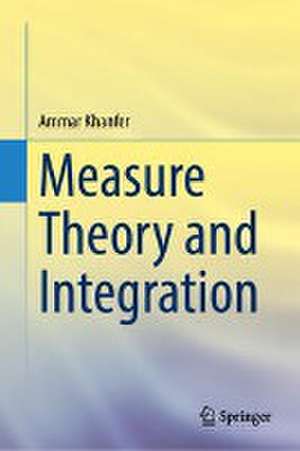Measure Theory and Integration
Autor Ammar Khanferen Limba Engleză Hardback – 9 sep 2023
Preț: 531.07 lei
Preț vechi: 624.79 lei
-15% Nou
Puncte Express: 797
Preț estimativ în valută:
101.63€ • 105.97$ • 84.47£
101.63€ • 105.97$ • 84.47£
Carte tipărită la comandă
Livrare economică 21 martie-04 aprilie
Preluare comenzi: 021 569.72.76
Specificații
ISBN-13: 9789819928811
ISBN-10: 9819928818
Pagini: 224
Ilustrații: XVII, 224 p. 1 illus.
Dimensiuni: 155 x 235 mm
Greutate: 0.52 kg
Ediția:1st ed. 2023
Editura: Springer Nature Singapore
Colecția Springer
Locul publicării:Singapore, Singapore
ISBN-10: 9819928818
Pagini: 224
Ilustrații: XVII, 224 p. 1 illus.
Dimensiuni: 155 x 235 mm
Greutate: 0.52 kg
Ediția:1st ed. 2023
Editura: Springer Nature Singapore
Colecția Springer
Locul publicării:Singapore, Singapore
Cuprins
Chapter 1. Measure Theory.- Chapter 2. Measurable Functions.- Chapter 3. Lebesgue Integration.- Chapter 4. Lebesgue Spaces.- Chapter 5. Abstract Measure Theory.
Notă biografică
Ammar Khanfer earned his Ph.D. from Wichita State University, USA. His area of interest is analysis and partial differential equations (PDEs), focusing on the interface and links between elliptic PDEs and hypergeometry. He has notably contributed to the field by providing prototypes studying the behavior of generalized solutions of elliptic PDEs in higher dimensions in connection to the behavior of hypersurfaces near nonsmooth boundaries. He also works on the qualitative theory of differential equations, and in the area of inverse problems of mathematical physics. He has published articles of high quality in reputable journals.
Ammar taught at several universities in the USA: Western Michigan University, Wichita State University, and Southwestern College in Winfield. He was a member of the Academy of Inquiry Based Learning (AIBL) in the USA. During the period 2008–2014, he participated in AIBL workshops and conferences on effective teaching methodologies and strategies of creative thinking, which made an impact on his engaging and motivational writing style. He then moved to Saudi Arabia to teach at Imam Mohammad Ibn Saud Islamic University, where he taught and supervised undergraduate and graduate students of mathematics. Furthermore, he was appointed as coordinator of the PhD program establishment committee in the department of mathematics. In 2020, he moved to Prince Sultan University in Riyadh, and has been teaching there since then.
Ammar taught at several universities in the USA: Western Michigan University, Wichita State University, and Southwestern College in Winfield. He was a member of the Academy of Inquiry Based Learning (AIBL) in the USA. During the period 2008–2014, he participated in AIBL workshops and conferences on effective teaching methodologies and strategies of creative thinking, which made an impact on his engaging and motivational writing style. He then moved to Saudi Arabia to teach at Imam Mohammad Ibn Saud Islamic University, where he taught and supervised undergraduate and graduate students of mathematics. Furthermore, he was appointed as coordinator of the PhD program establishment committee in the department of mathematics. In 2020, he moved to Prince Sultan University in Riyadh, and has been teaching there since then.
Textul de pe ultima copertă
This textbook contains a detailed and thorough exposition of topics in measure theory and integration. With abundant solved examples and more than 200 problems, the book is written in a motivational and student-friendly manner. Targeted to senior undergraduate and graduate courses in mathematics, it provides a detailed and thorough explanation of all the concepts. Suitable for independent study, the book, the first of the three volumes, contains topics on measure theory, measurable functions, Lebesgue integration, Lebesgue spaces, and abstract measure theory.
Caracteristici
Provides a very detailed and thorough exposition of topics in measure theory and Lebesgue integration Supplements with plenty of solved examples and more than 200 problems Combines the standard material studied in graduate courses in mathematics
